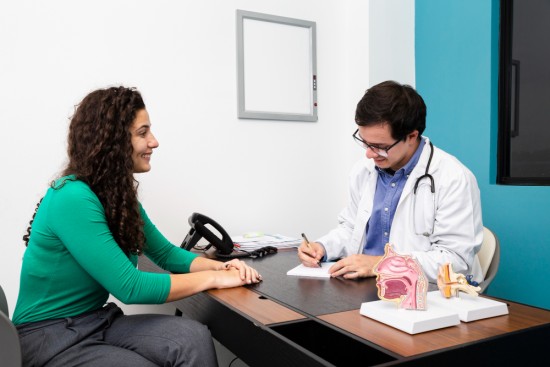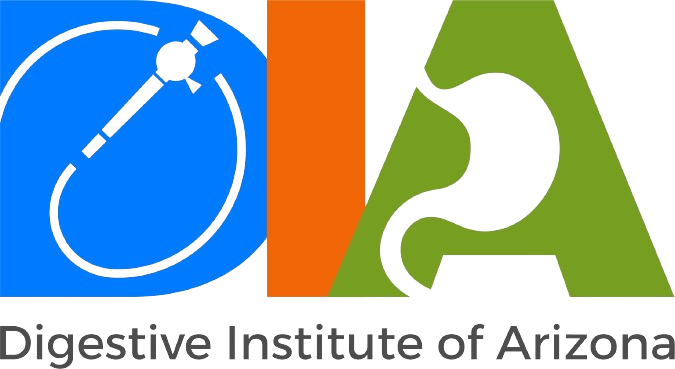Gastroesophageal Reflux Disease (GERD) Treatment
- Home /
- Gastroesophageal Reflux Disease

Gastroesophageal Reflux Disease (GERD) Specialists in Phoenix, Arizona
Get Best GERD Treatment Now at Our Clinics in Arizona
Gastroesophageal Reflux Disease (GERD) is a digestive disorder that results from chronic acid reflux, which happens when stomach acid flows backward into the esophagus, the pipe joining the mouth and stomach. This regurgitation irritates the lining of the esophagus and can heartburn.
The Digestive Institute of Arizona consists of a team of skilled gastroenterologists and GERD Specialists with extensive experience in diagnosing and treating GERD at our clinic located in Phoenix and Gilbert, Arizona. We know how important treating this condition is for your everyday life and health.



Symptoms of GERD
GERD’s most common symptom is heartburn, which is a burning chest pain that worsens upon eating, lying down, or bending. Infrequent heartburn is normal, but frequent heartburn can indicate GERD.
Symptoms of GERD may include:
- Regurgitation (a sour taste in your mouth)
- Acid reflux (the feeling of stomach contents coming up through your esophagus)
- Dysphagia
- Chest pain (not always related to heartburn)
- Nausea
- Vomiting
- Hoarseness
- Chronic cough
- Sore throat
- Bad breath
Causes of GERD
GERD is an illness caused by inappropriate relaxation or weakening of the lower esophageal sphincter (LES), a muscular valve in the last part of the esophagus. This causes gastric acid and its contents to reflux into the esophagus.
GERD could be attributed to several factors, including:
- Hernia: A hiatal hernia is when your stomach pushes through part of your diaphragm, which is the muscle that separates your chest from your abdomen, leading to the weakening of the LES.
- Obesity: Extra weight adds pressure on your abdomen, pushing on your stomach, making the LES weaker.
- Pregnancy: Hormonal changes during pregnancy can loosen up the LES.
- Particular foods and beverages: Spicy foods, acidic foods (citrus fruits, tomatoes), fatty meals, chocolate, peppermint, caffeine, and alcohol can irritate the esophagus and worsen symptoms of GERD.
- Drugs: Particular medications like aspirin, ibuprofen, and certain antidepressants may cause relaxation of the LES.
- Smoking: Smoking weakens the LES and irritates the esophagus.
GERD Diagnosis At Our Arizona Clinics
Our gastroenterologists and acid reflux doctors at the Digestive Institute of Arizona, located in Gilbert, Arizona, will conduct a comprehensive evaluation to diagnose GERD. This may involve:
- Medical history: Discuss your symptoms, including their frequency, severity, and any triggers.
- Physical examination: A general physical exam to assess for potential underlying causes.
- Upper endoscopy: A minimally invasive procedure using a thin, flexible tube with a camera to examine the inside of your esophagus, stomach, and duodenum (the first part of your small intestine). During this procedure, tissue samples (biopsies) may be taken to rule out other conditions.
- Esophageal manometry: Myotonic pressure measurement techniques are a way to determine how well the muscles in your esophagus work by determining their power and cohesiveness, including the lower esophageal sphincter.
- Ambulatory pH monitoring: A thin wire is put through your nose into your throat. This tube gauges the degrees of acidity in your esophagus for one day, thus detecting acid reflux cases.

GERD Treatment in Phoenix, AZ - Available Options at Our Clinics
GERD treatment entails decreasing stomach acid production, strengthening the LES, and controlling symptoms. Our GERD specialists at the clinics in Phoenix and Gilbert, AZ, provide different treatment options for GERD based on the needs of individuals, which include:
Alterations in lifestyle
Diet and weight management
Avoiding foods that trigger heartburn, eating smaller meals more frequently, losing weight, and elevating the head of your bed at night are all ways to alleviate GERD significantly.
Smoking cessation
Stopping smoking is critical in managing GERD due to its adverse effects of weakening the LES and damaging the esophagus.
Medications
There are various kinds of drugs for GERD treatment. These include:
Antacids
Antacids neutralize stomach acid and relieve heartburn quickly.
H2 blockers
They decrease the production of stomach acid.
Proton pump inhibitors (PPIs)
PPIs are the most powerful substances to lessen acidity in the body and are often preferred as first-line therapy for GERD.
Endoscopic Procedures
In some cases, GERD treatment may require minimally invasive endoscopic procedures. These include:
Radiofrequency energy
Using radiofrequency energy can strengthen the lower esophageal sphincter.
LINX procedure
A small magnetic aid is inserted around the lower esophagus valve to toughen it and hinder acid backflow.
Surgery For GERD Treatment in Arizona
GERD treatment via surgery is ordinarily used as a very last resort after other remedies have failed. Laparoscopic fundoplication is one of the most common surgeries done for GERD, and it consists of creating a valve mechanism that prevents stomach acid from returning to the esophagus. Our team of gastroenterologists specializes in GERD surgery and you can get this done at our facility in Gilbert, Arizona.
Our Commitment to Your Digestive Health
We at the Digestive Institute of Arizona are dedicated to offering sympathetic therapy and elaborate support for patients with GERD. Our team of harmonious gastroenterologists, acid reflux specialist, surgeons, dietitians, and support staff ensures that each individual receives the best care from diagnosis to treatment and beyond.
Those suffering from GERD symptoms or having been just diagnosed with this condition should book an appointment with one of our experienced GERD doctors as soon as possible. This will enable you and your doctor to develop a personalized treatment plan to manage your symptoms, thus improving your quality of life.
FAQs About GERD
People with untreated GERD may have complications, for instance, esophagitis – the inflammation of the esophagus; esophageal strictures – narrowed regions in the esophagus; Barrett’s syndrome – a precancerous disorder, and in rare cases even cancer of the esophagus.
In some cases, dietary changes, herbal remedies, acupuncture, or relaxation techniques may be helpful. However, medical consultation is important before using these alternative treatments to ensure their safety and efficiency.
Each person’s recovery period differs in terms of symptom intensity, commitment to recommended therapy, and overall well-being. Some patients begin experiencing relief from symptoms after a few days or weeks of starting medical treatment. However, others may have to wait longer until they observe significant changes only.
